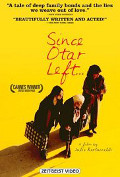
Directed by
Julie Bertuccelli
102 minutes
Rated M
Reviewed by
Sharon Hurst

Since Otar Left
Synopsis: Three generations of women live in a tiny apartment in a crumbling Georgian town. The lives of Eka (played by 90-year-old Esther Gorintin), her daughter Marina (Nino Khomassouridze), and granddaughter Ada (Dinara Droukarova) are overshadowed by Eka's son Otar, who has left to work in Paris, and upon whom Eka dotes, much to Marina's chagrin. When news of Otar's accidental death reaches Marina and Ada, they hide the news from Eka, for fear it will kill her. The lie soon compounds.
Director Bertuccelli comes from a documentary-making background and has a fine eye for detail. The opening scene where the three women sit silently in a café tells us so much about their closeness and their frustrations with each other. The tiniest of gestures is lovingly captured and an immediate sense of believability and affection for the characters is created.
Deeper undercurrents run below the surface plot. Eka is from the old school, the Stalinist Soviet Union, a long suffering woman who has a huge library of French books, loves to speak French, and has always dreamed of going there. Marina has undergone the breakup of the USSR and is in some sort of limbo, compounded emotionally by her awareness that her brother is the favoured sibling. Marina has trained as an engineer, yet is reduced to selling junk in a flea market. Ada is the new wave of post-Soviet youth - full of dreams and ambitions, and yet still with a fierce loyalty to her family, especially her grandmother.
Together these characters put up with the daily privations: mother and daughter must share a bed; too often the electricity fails and candles must be lit; the phone line regularly goes dead. Letters however are a constant and their importance is established early on with a terrific scene in a dilapidated letter sorting office. There are several scenes where Ada reads Otar's letters aloud to Eka, and others where Marina ministers to Eka by washing her hair, or Ada rubs her grandmother's feet; in these we see just how much care and time has been taken with the direction, to allow us intimately into these characters' lives and emotions. Although the film centres around the women, one male character, Tengui,, Marina's sometime lover, manages to sum up the entire situation in one sentence and with such clarity that underlines the whole impact of lies on a personal and broader socio-political level.
Bertuccelli's film taps into that basic human need for dreams and longings, explores the nature of lying, and looks at how something done with one motive may ultimately become a catalyst for something unintended. And the fact that Gorontin came to acting by changing her life at the ripe old age of 85 lends a deliciousness to a warm-hearted, optimistic film.

Want more about this film?


Want something different?




